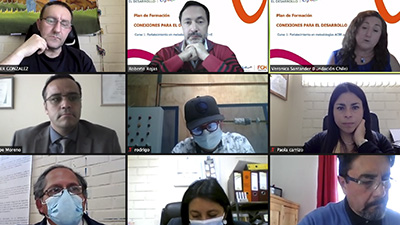- The first stage of the training plan “Fortalecimiento en Metodología ACBR para I+E” of “Conexiones para el Desarrollo” aims to strengthen institutional pedagogical leadership in Technical Professional High Schools in the Coquimbo Region.
The Conexiones para el Desarrollo program has initiated an innovative training plan aimed at strengthening the learning of future technical professionals in the energy sector, with the participation of directors and teachers from six technical-professional high schools in the Coquimbo region.
The program held sessions on November 25th and 26th, with an average attendance of 22 people, including directors, technical-pedagogical unit heads, specialty coordinators, and electricity and electronics teachers from San Martin de Porres High School, Ignacio Carrera Pinto High School, Florencia Nightingale College, Pedro Regalado High School, CORESOL Adult High School, and Ovalle Polytechnic High School. The last sessions of this stage will take place on December 2nd and 3rd.
This course is the first of a three-stage online training plan, which includes Fundamental I+E, Leadership I+E, and Design and Development of I+E Projects. The courses are taught by educational innovation and emerging technologies consultants for teaching and learning, Javier González and Roberto Rojas.
Conexiones para el Desarrollo, aimed especially at the specialties of electricity and electronics in technical-professional secondary education, seeks to contribute to the strengthening of local transformation capacities in the territory through a methodological approach based on challenge-based learning (ACBR), which allows students to acquire innovation and entrepreneurship skills.
Participants valued the course’s call and expressed that, despite the large number of end-of-year activities, there is great interest in addressing industry-related topics and learning participatory methodologies in the face of the innovation challenge.
Rodrigo Bravo, Territorial Relations Manager of ISA InterChile, stated that “this initiative allows us to work with technical high schools to strengthen the educational ecosystem and generate transformations in the territories of influence, providing tools to teachers and students, not only to strengthen technical skills, but also to assume a role that allows them to transform their territory.”
Through their participation in this course, teachers will acquire the necessary tools to install a new teaching approach based on the active participation of students, with a focus on innovation and entrepreneurship, better addressing current challenges in the energy sector and identifying the competencies that students need to enter the workforce.
Vanessa Arévalo, project manager at Fundación Chile, adds that with this course, “we seek to develop skills in teachers that are at the service of young people who, in the current context, must increase their capacity to adapt to social and labor-related changes, transforming their learning spaces into dynamic environments. For this, the implementation of active teaching and learning methodologies focused on the development of innovation and entrepreneurship skills is key.”


